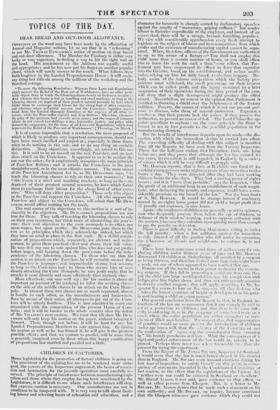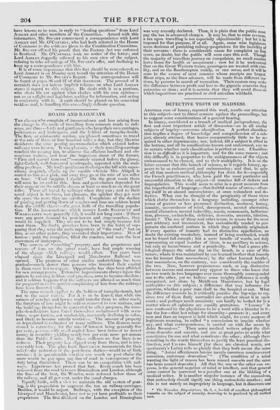CHILDREN IN FACTORIES.
MORE legislation for the protection of factory children is going on. The provisions of the existing law arc to he rendered more strin- gent, the powers of the Inspectors augmented, the hours of recrea- tion and instruction for the juvenile operatives more carefully re- served. The principle of interference between manufacturing capi- talists and those whom they employ having been sanctioned by the Legislature, it is difficult to see where such interference will stop. But extreme caution is necessary. Our manufactures are not in condition to be tampered with. It is very easy to talk about limit- mg labour and selecting hours of relaxation and education, and a
character for humanity is cheaply earned by declamatory speeches against the cruelty of "mercenary, griping ruffians ;" but render labour in factories unprofitable to the employer, and instead of an overwerked, there will be a savage, because famishing, populace. We view with considerable apprehension every fresh attempt to legislate on the subject of labour and its remuneration ; from which profits and the existence of manufacturing capital cannot be sepa- rated. When, therefore, officers of the Government arc authorized to say to the owner of a factory—" You shall not employ this child more than a certain number of hours, or you shall allow hint to leave his work for such a time,"—we reflect, that Par- liament may have empowered its officer to force that capitalist into the Gazette, break up his establishment. and reduce multi- tudes, relying on him for daily bread, to als-olate beggary. No-
body aware of the intense competition which the factory pro- prietors must withstand, the small percentage On their returns which can be called profit, and the injury su:tained by a brief suspension of their operations during the bity period of the year, will denv that a slight derangement might produce the effect stated. 'Nevertheless, we concur in the opinion that Parliament is justified in throwing a shield over the helplessness of the factory children. Poverty, the causes of which it is not our present pur- pose to discuss, robs them of natural protectors. Experience teaches u:, that ;heir parents lack the power, if they possess the. inclination, to prevent an excess of toil. The Lord Chancellor ap- points guardians to orphans : on the same principle the State is bound to act in loco pareidis to the youthful population in the manufacturing districts.
But the benefit of interference depends upon its mode—the dis- cretion with which the benevolent design is carried into effect. The exceeding difficulty of dealing with this subject is manifest from all the Reports we have seen from the Factory Inspectors. Those for the half-year ending 31st December, 1S3S, arc lying bcfbre us ; and they prove that although the ,, ,, . has existed for five years, its execution is still impeded, in England, by a variely of causes which it will be very difficult to grapple with.
Mr. lloaxErt reports, that a firm at Rochdale was fined 37. lbr working young persons under eighteen years of age more than twelve hours a day. They were detected after they had been working thirteen hours for nine days. They had a movihg power of eighty horses; and it is "more than probable," says the inspector, " that the profit of an additional hour in an establishment of such magni- tude, after deducting the penalty and expenses. would leave a con- siderable premium on the breach of the law." Nut the least doubt of it, Mr. Hortxml. It would lie strange indeed if machinery moved by an eighty horse power did not yield a larger profit than
penalty and expenses, m nine hours. Again—the employers of children are generally operative spinners, men who frequently procure them below the age of thirteen, in defiance of their masters warning, (not to suppose collusion with the masters,) because they calculate upon gaining more than enough to pay the penalty on detection. There is great difficulty in finding Magistrates willing to inflict the full penalty : when a law militates against the Immediate worldly interest of all the parties who fall under its operation, the reluctance of friends and neighbours to enforce it, is not strange.
There have been numerous convictions 1,f tier ploying children under thirteen yeA.s of age; and Mr. IlossFn discovered 112 children at Staleybridge. ell certified by a surgeon as la.ing thirteen, and therefore worked na we than forty-eight hours a week, not one of whom appeared to have reached that age. Parents use all the means in their power to deceive the examin- ing surgeon. If they fail in procuring a sertieate 11'0111 one, they put the child into large working-clothes, dpi Isis complexion with indigo, give him higher shoes, and thus not unfrcque•WS1y contrive to deceive another surgeon : they will apply. according to Mr. In- spector SA !OWES, to time or five -urn. ca-. till they tisd ate who " takes the lowest quantum of licight or dtaclopment as his guide in certi:icating a child or young person."
Our general conclusion from the 'Report is, that, in England, in- fractions of the law arc so numerous that it can scarcely be said to act as a protection to children ; and that the re is the -:one diffi- culty in enthreing it, as in the stopf,age of conit„band trade on a coast, where the entire populat; sat are eithcr smug:Jen.: or Wei- pie:ItS Of illicit merchandise. Wc sus,i tIstt augmentation of penalties would no more prcv!qit the introduction of children under age into a mill, than the seisms s of the Coast Guard and the confiscation of strgoes stop tin- contrabandi,t from '` running in " his brandy puncheons and 1;aas What the conequenees of a rigid and perfect tairore,,,,,ent of the hav would be, remain to be proved. Perhaps there never was a le,,s fitvourable tine than the present for trying the experiment. From the Report of Mr. 3 ■ M I:5 Ferusnr, Ttillector for Seollsod, it would seem that the law is much better obeyed in his oistriet than in England. Mr. STI'Airr made unusual exertions during his last tour of inspection, to :-ZItiSfy hiiiiSc1S• on this point, in e,,nse- gnence of statements hazarded in the Combination Committee of last session, to the effcet that the regulations of the Factory Act "neither were nor could be enforced in Scotland or elsewhere." Mr. Sheriff' ALISON. it was said, gave evidence to that effect, as well as other persons from Glasgow. But, in a letter to Mr. SruAnr, Mr. ALISON denies that he made such a statement on his own authority; and Mr. STUART, oll inquiry, became convinced that the Glasgow witnesses gave evidence which they could not
have known to be true, in reply to " leading questions" from Lord ASHLEY and other members of the Committee. Armed with this information, Mr. STUART commenced a correspondence with Lord ASHLEY and Mr. O'CoNNELL, who had both referred in the House of Commons to the evidence given to the Combination Committee. Mr. STUART offered his proofs that the Factory Act was enforced in Scotland. Mr. O'CONNELL took no notice of the letter ; and Lord ASHLEY doggedly adhered to his own view of the subject, refusing to take advantage of Mr. Srusar's offer, and declining to keep up a correspondence with him. It is of some importance that this fact should be remembered, as Lord ASHLEY is on Monday next to call the attention of the House of Commons to Mr. STUART'S Report. The correspondence will he found at pages 36 and 37 of that document. The perusal of it certainly does not induce implicit reliance on what Lord ASHLEY states in regard to this subject. Ile deals with it as a partisan, who shuts his car against what clashes with his own opinion— not as an enlightened legislator, seeking for information, and acting in conformity with it. A curb should be placed on his somesthat reckless zeal, in handling this exceedingly delicate question.



























 Previous page
Previous page